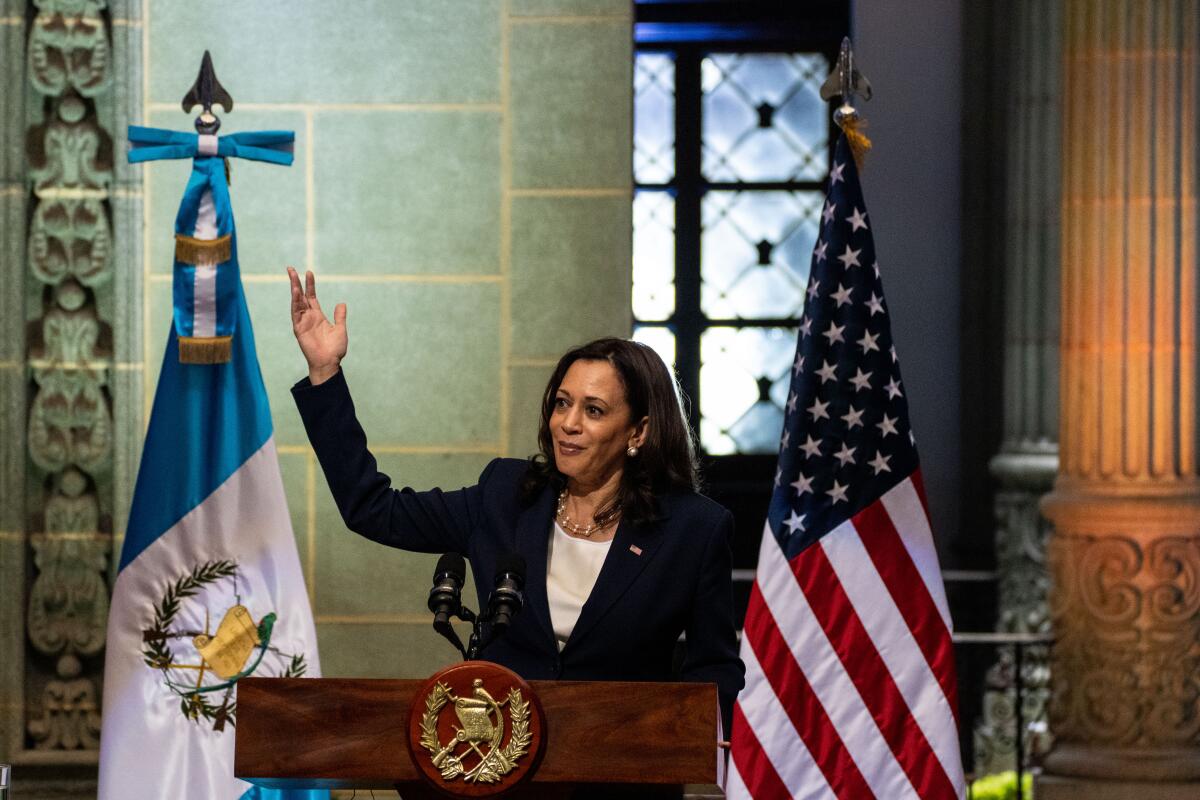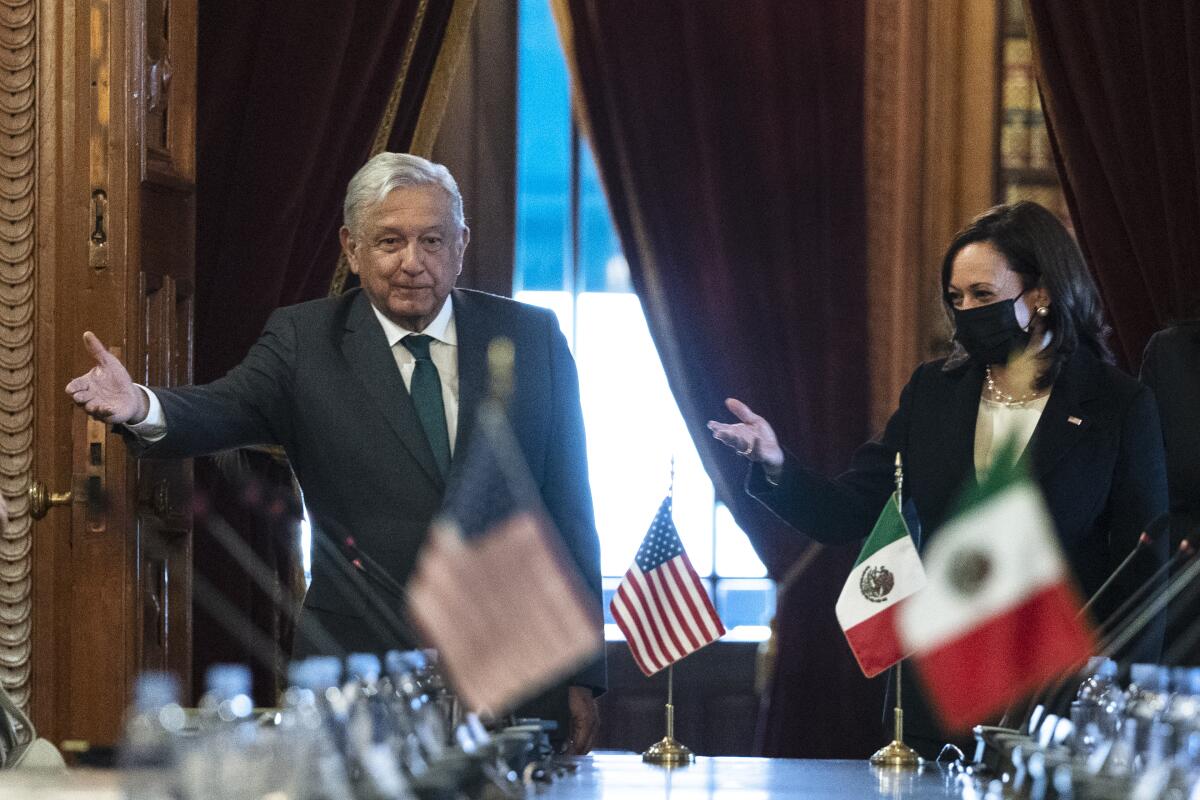Essential Politics: How did Harris’ Central America trip go? Here’s what two experts have to say

This is the June 9, 2021, edition of the Essential Politics newsletter. Like what you’re reading? Sign up to get it in your inbox three times a week.
Vice President Kamala Harris walked off Air Force Two in the wee hours Wednesday morning after one of her highest profile experiences since taking office — a foreign trip to a region that is central to her growing portfolio.
The two-day trip to Guatemala and Mexico showed the complexity of the assignment President Biden has given her — trying to reduce immigration flows from Central America — and the political trip wires she faces. I traveled with Harris and wrote about her encounters with foreign leaders and the political controversies she spawned at home.
The left was angry that she told would-be migrants from Guatemala to stay home and that they would be turned away if they made it to the U.S. border. The right made hay of her changing answers on whether she would go to the southern border, a place she has visited as California’s attorney general and then as a senator from the state, but not since becoming vice president.
Good morning and welcome to Essential Politics, Kamala Harris edition. We have a few stories on those controversies on the site today.
Rather than rehash the politics, I turned to a pair of policy experts to assess the trip, and the bigger questions it raises about the Biden administration’s strategy for reducing migration. Stephen Johnson and Rebecca Bill Chavez both served as senior advisors specializing in the region, Johnson in the George W. Bush administration, Chavez in Barack Obama’s. Chavez also worked as an advisor on Harris’ presidential campaign.
Our conversation has been condensed and lightly edited for clarity.
Get our L.A. Times Politics newsletter
The latest news, analysis and insights from our politics team.
You may occasionally receive promotional content from the Los Angeles Times.
Asking the experts
Bierman: What do you think was accomplished on the trip?
Chavez: The fact that it was the vice president’s first trip abroad signaled that the administration is committed to addressing the drivers of migration: pervasive violence, crushing poverty exacerbated by climate change, and widespread government corruption. No set of border policies, no matter how strict, will keep desperate people who lack hope from fleeing the Northern Triangle [Guatemala, Honduras and El Salvador], so going to the source and addressing these root causes is a step in the right direction for what is a generational challenge.
Johnson: The trip served to establish relationships and demonstrate U.S. interest in helping two neighbors solve problems that, one way or another, end up on our doorstep. In Guatemala, Harris laid down clear markers on corruption, a behavior that hobbles government service delivery and creates space for criminal enterprise — major factors that trigger migration. A former prosecutor herself, Harris’ visit must have been some comfort to Juan Francisco Sandoval, the beleaguered head of Guatemala’s Special Prosecutor’s Office Against Impunity.
Did it meet your expectations? Any surprises?
Chavez: I was pleased to hear that Harris pushed the corruption issue in Guatemala. We shouldn’t turn a blind eye to the recent assaults on judicial autonomy and anti-corruption mechanisms in the three Northern Triangle countries and in Mexico. In all four countries, presidents have taken deliberate steps to undermine checks and balances.
Johnson: Nobody expected major agreements or breakthroughs, which require lots of advance planning and meetings. And while Harris came bearing gifts, you’ve got to know that they probably wouldn’t be enough to convince her counterparts from looking increasingly to China as a development partner. China doesn’t worry about corruption, and its support comes with fewer strings.
What did you make of Harris’ emphasis on telling people in Guatemala that they would be turned back if they reach the border? Is that at odds with her message that people are fleeing because they have no choice because of violence and severe poverty?
Chavez: I just returned from a trip to the border, and I can tell you that, as Harris recognizes, the vast majority of migrants don’t have a choice when it comes to embarking on the harrowing journey to the U.S. It’s understandable that she would want to deliver this direct message. Unfortunately, the words “don’t go” aren’t going to impact the decision making of a mother whose children’s lives are threatened by gangs or a father who can’t put food on the table for his family. Such language — especially if it isn’t coupled with a plan for effectively addressing root causes and providing help like COVID-19 vaccines — won’t help. It’s why addressing root causes in a real and robust way is the right way forward.
Johnson: No doubt the Biden administration genuinely wants Guatemala’s would-be migrants to know that. But it probably fell on deaf ears. For many, falling over a cliff at night or dealing with the U.S. Border Patrol is preferable to living with crop-destroying weather events, death threats from gangs and joblessness facing youth in big city slums or poor rural villages.
How much and how quickly can we really expect migration from the Northern Triangle to slow, if at all?
Chavez: We have to be realistic. The drivers of migration are deep-seated, and a successful strategy will only be measured in years and perhaps decades — and will transcend administrations.
This is why one of the most important things the Biden administration can do is to put in place strong institutions to support funding and technical programs that assist the region. Otherwise we will face a situation like we did in 2019, when [President] Trump cut funding for the Obama administration’s Central America Strategy and reversed the positive impact of a promising approach. That lack of continuity contributed significantly to the issues we face today.
Johnson: Not anytime soon. For that to happen, Guatemala’s government would need to address a countryside crawling with drug traffickers, public schools that lack running water and books, and a climate of impunity where crony judges serve a monopolistic business class eager to keep a lid on economic development to stifle competition. Similar or worse conditions exist in Honduras and other countries sending migrants through Central America to the United States.
Did you learn anything new about the Biden administration’s relationship with Mexico?
Chavez: The breadth of topics covered in the meeting with AMLO [President Andrés Manuel López Obrador] demonstrates that our bilateral relationship is about much more than migration. It’s time to move on from the transactional approach of the Trump years.
JOHNSON: Priority One was to reestablish a cooperative relationship with López Obrador, damaged last October with the uncoordinated U.S. arrest of a former Mexican defense minister. The vice president did that, managing to announce some investments and recommitting to work with Mexico in helping Central America. Left for another day was the elephant in the room — drug-fueled insecurity which could trigger a resurgence in Mexican migration.

Enjoying this newsletter? Consider subscribing to the Los Angeles Times
Your support helps us deliver the news that matters most. Become a subscriber.
Around the world
— The Senate approved a sweeping effort to fortify the nation’s ability to compete with China’s economic and political ambitions by investing billions of dollars in scientific research and American manufacturing across several industries, including artificial intelligence, robotics and wireless service, reports Jennifer Haberkorn.
— President Biden is likely to receive a warm welcome from European leaders when he arrives in the United Kingdom today. But not being Trump is the easy part, writes Eli Stokols.
— Trump once called Egyptian President Abdel Fattah Sisi his “favorite dictator.” But though Biden promised “no blank checks,” Egypt’s long-running relationship with Israel has put Secretary of State Antony J. Blinken in a tricky position, Tracy Wilkinson writes.
The view from Washington
— The Supreme Court dealt a setback to hundreds of thousands of immigrants who have so-called temporary protected status, ruling they can’t have a green card if they entered the country illegally, David G. Savage writes. Separately, the court declined to take up a case that asked it to decide whether requiring only men to register for the draft is sex discrimination.
— The Justice Department on Monday announced it will require federal agents to wear body cameras when serving arrest warrants or conducting raids, writes Del Quentin Wilber. It’s a shift that aligns federal law enforcement more closely with the requirements placed on local police officers.
— Also from Wilber: The Justice Department recovered $2.3 million in cryptocurrency ransom that Colonial Pipeline paid to hackers whose cyberattack last month shut down its major East Coast pipeline. The company’s chief executive defended paying the ransom, even as authorities have discouraged such payments.
— He’s from one of the most influential families in modern politics. But as George P. Bush pursues the Republican nomination for Texas attorney general, he’s betting that fealty to Trump will win him more votes, writes Mark Z. Barabak in his latest column.
— Virginia Democrats chose Terry McAuliffe to be their nominee for governor Tuesday, setting the stage for one of the biggest electoral tests of strength between the parties since Biden ousted Trump, Janet Hook writes.
— The White House has dropped Trump-era executive orders that attempted to ban the popular apps TikTok and WeChat and will conduct its own review of national security risks.
The view from California
— Actor Alyssa Milano says she has her eye on a congressional seat — specifically the one held by California’s 4th District Rep. Tom McClintock, writes Christie D’Zurilla.
— When FBI agents asked for permission to rip hundreds of safe deposit boxes from the walls of a Beverly Hills business, U.S. Magistrate Steve Kim set some strict limits on the raid and how to handle the boxes. The agency is now trying to confiscate $86 million in cash and millions of dollars more in jewelry and other valuables found in the boxes, sparking a debate about forfeiture laws, writes Michael Finnegan.
Programming note: The Essential Politics team is taking a short break. We won’t be sending a Friday edition, but John Myers will be back in your inbox on Monday morning.
Stay in touch
Keep up with breaking news on our Politics page. And are you following us on Twitter at @latimespolitics?
Did someone forward you this? Sign up here to get Essential Politics in your inbox.
Until next time, send your comments, suggestions and news tips to politics@latimes.com.
Get the L.A. Times Politics newsletter
Deeply reported insights into legislation, politics and policy from Sacramento, Washington and beyond. In your inbox three times per week.
You may occasionally receive promotional content from the Los Angeles Times.




